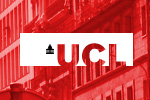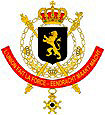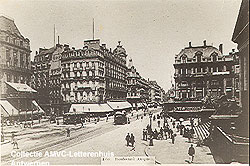

 |
 |
 België 1830: >L’union fait la forceWilliam I’s attempts to introduce Dutch as the official language in Belgium in the early nineteenth century have borne some fruit. But when the local population decides to get rid of the Dutch in >>1830, they also throw the Dutch language overboard. Once more, French becomes the language of the administration, judiciary and education. In Flanders, this causes people to react and the Dutch language gradually gains some importance. In Brussels on the other hand, the >Frenchification process can no longer be halted. That is why until today, Brussels remains a thorn in the side of the supporters of the >Flemish movement. The constitution of independent Belgium includes freedom of language, even though in practice all the administration and judiciary are once more and solely in French. The few who stand up for the use of Dutch are regarded as traitors, who are in league with the ousted oppressor. The new Belgian leaders aim for unity, which is why the Belgian coat of arms carries the motto: L’union fait la force. They are monolingual French speakers and they are –exactly like their Dutch and French predecessors- convinced of the ‘one language, one country’ idea. According to them, in the case of Belgium, that language could really only be French. Charles Rogier, who will later become Prime Minister, doesn’t beat around the bush:
The centre of power is held by the French speakers (inclusive of the Frenchified Flemish elite) and the majority of the country’s capital is based in Wallonia. As a consequence, things aren’t looking good for the Dutch language. A language that has no capital and no power is doomed to disappear. The language spoken by the Flemish (about 50% of the Belgian population at the time) is not uniform and the users do not master the language sufficiently to be able to use it in all official situations and decision making. For that reason, it is not incomprehensible that the leaders of government decide to opt for French. Nevertheless, a group of intellectuals emerges that steadily stands up for the Dutch language. They form the beginning of the Flemish Movement, an umbrella term for the various groups and individuals who cause a U-turn in the Belgian language situation. >>The Flemish Movement and the language lawsThis change was of course very gradual, an overview of the most important turning points:
 This means that better times are ahead for the use of Dutch in Flanders, which is also climbing out of its economic low and starts to industrialise. The formerly inarticulate Flemish workers get organized, acquire the right to vote and exercise their right to express themselves in their own language. the twentieth centuryIn the beginning of the twentieth century, schools in Flanders acquire the right to teach in Dutch and voices are heard to ‘Dutchify’ the university of Ghent. This would create a larger potential for a Flemish intellectual elite and as a consequence, more demands for a monolingual Flanders would be voiced. At this point in time, Flanders is still officially bilingual and Wallonia is monolingual French. The Walloons are hard-pressed by the increasing radicalization of the >Flemish Movement. They don’t feel much for having to learn Dutch. As a result, it is actually the Walloons who are the first to suggest splitting the country in two on the basis of language. This also has to do with the fact that Wallonia has a anticlerical, progressive and socialist majority whereas Flanders is predominantly Catholic and conservative, which makes the governing of the country together rather difficult. As a result, in 1930, Flanders becomes monolingual Dutch and the >>Dutch university of Ghent is a fact. BrusselsWhile the situation for Dutch speakers in Flanders improves visibly, quite a reversed pattern takes shape in Brussels. As Flanders becomes more Flemish, Brussels seems to become more French. The 1846 census shows that 38.4% of Brussels inhabitants is French-speaking. That means that French is the language they use most often. If you have a look at the graphs below, you can see that their number rises drastically between 1880 and 1890. Next, this group stagnates somewhat, while the number of monolingual French speakers increases noticeably and the share of monolingual Dutch speakers decreases considerably. From 1910 onwards, multilingual speakers are questioned about their language use; a group which at this point in time consists of more than 50% of the population. Their answers show that nearly 30% of this group uses Dutch most often and about a quarter French. The tide has turned by 1946, when 36% of all bilingual and multilingual inhabitants claim to use French most often and only 15% use Dutch more.
source data : Witte et al 1987 :22 question 2How would you explain this phenomenon? >AnswerIt is advisable to be cautious with the analysis of this data, because the answers were sometimes politically biased and heavily contested as a result. For example, it is possible that some Flemings at the end of the nineteenth century would have claimed to be monolingual Dutch speakers, even if they weren’t. They may have done so out of sympathy for the Flemish movement. On the other end, some of the interviewers, who were always French-speaking, may have noted down that someone was bilingual even if s/he only spoke a few words of French. After the Second World War (1945), the atmosphere was tense and very anti-Flemish, because a few prominent members of the Flemish Movement had collaborated with the Germans. As a consequence, some Dutch speakers may have preferred to keep quiet about their background. So, the figures are definitely not very exact, but they do clearly indicate a trend; the Frenchification of the capital makes great strides forward. why the Frenchification?Language and power are close allies. French was the language of the ruling classes, administration, judiciary, army and intellectual and cultural elite, in short; the top layer of society. As >Charles Rogier already put nicely in the ninetheenth century, it was only possible to climb the social ladder with French. This was nowhere more apparent than in Brussels, where the government was seated and officials were in large supply. Whoever wanted to count, had to speak French. Brussels was becoming a metropolis and attracted migrants from both the impoverished Flemish region as from the wealthy, industrialised Walloon area. Between 1830 and 1900, the population of Brussels grew from 140 000 to 626 000 people. This number stagnates thirty years later, in 1930, at about 915 000. However, there was a big difference between the Flemish and Walloon migrants. Generally, the migrants from Wallonia were well-educated and wealthy, and held office in public administration or the world of finance and industry. The Flemish migrants on the other hand were manual labourers who spoke a coarse dialect. Because of the lower social position of the speakers of Dutch, the status of their language was very low too. This was unlike Flanders, where a Dutch-speaking elite was emerging, which became stronger the more education was offered in Dutch. In Brussels however –through the lack of clear language regulations – nearly all schools were run in French. That is why it didn’t take long for the recent immigrants from Flanders, just like the majority of original Dutch speakers in Brussels, to pick up French. The Frenchification of Brussels is therefore not a consequence of a large influx of Walloons, as is sometimes thought, but of the Frenchification of the original Dutch-speaking population, be it under heavy social pressure. Brussels city dialect The Flemish in Brussels in the nineteenth and the first half of the twentieth century mainly speak a whole range of local dialects. Because of the increasing suburbanization, those dialects mingle and a more uniform version emerges. Just like elsewhere in Flanders, Dutch in Brussels standardises and this dialect nearly dissapears altogether. However, it is saved from a certain death by a true academy, founded in 1991: the Academie van het Brussels, which gives the Brussels dialect a new life through music, theatre and publications. The Brussels city dialect is often confused with the so-called ‘Beulemans’, which is a mix of French and Brussels dialect. This language was made famous by the play: Le mariage de mademoiselle Beulemans (1940), which uses this clumsy and inarticulate language. Here’s a nice example:
The Brussels city dialect is without a doubt interspersed with French words, but it descends from Medieval Dutch and has a typical Flemish character. It can also be understood by other Flemish dialect speakers and it is an interesting bit of popular local culture, which is cherished by tourists and locals alike. In 1993, the Crèateef Complot zonner Complekse started to produce cheerful music in Brussels dialect. The well-known Brussels writer Geert Van Istendael also wrote lyrics for this company. He wrote the song De Zwéttén aman and here is one stanza:
around the centre of BrusselsThe Frenchfication started in the inner city of Brussels, but through a growing process of suburbanisation, the municipalities around the city of Brussels Frenchified too and at an amazing speed. The graphs below show a few examples. The percentage indicates monolingual French or Dutch speakers. The total is less than 100 in the later counts, because the number of bilinguals increases and they are not represented here.
So a municipality such as Etterbeek evolved from a nearly entirely Dutch-speaking place to a majority of monlingual French speakers in a hundred years. And Elsene, which was already half French-speaking to start with, has lost nearly all of its monolingual Dutch speakers one century later. In 1921, ‘Brussels’ meant the city of Brussels and fifteen municipalities around it. A law was passed in 1932, which would contribute to the expansion of bilingual Brussels. This law stated that whenever a municipaltiy in the monolingual Dutch periphery around Brussels acquired more than 30% French speakers (according to the census), this municipality had to become bilingual in its external contacts. If this number reached 50%, French would have to be introduced in the internal administration as well. That is why three municipalties were added to ‘Brussels’, resulting in the current conglomerate of 19 municipalites, each with their own local administration. Brussels did temporarily become one administrative unit during the German occupation in the second World War, when the Germans abolished the local administrations and ran a pro-Dutch course, which was partly succesful in education. As the Nazi regime had many opponents, many inhabitants of Brussels assosicated a pro-Dutch language policy with the Nazi’s. As a consequence, the resentment towards anything Flemish became even greater than it already was, which was also noticeable in the language census of 1947, right after the war. Bruxelles, here I come Below, you can read an extract from Eric de Kuyper’s autobiographical novel In de zon, uit de schaduw. De Kuyper is a Flemish author who grew up in Brussels, moved to Antwerp as an adolescent, and returns to Brussels as a theatre student. He is very insecure about his abilities but also about his language. The next fragment is situated in Brussels in 1960 when Eric is nineteen years old. He had always managed to move between the two languages, Dutch and French. At home the language used was more or less Dutch and Dutch culture was not entirely unknown. Still, they would live off and let themselves be fed mainly by anything that came from the South; the North was still virgin territory that would only be discovered by the Flemish in the sixties, when the borders became porous. Moreover, he had attended a Dutch-speaking >Jesuit College. Like an invisible net, French culture was stretched over their daily actions and thoughts. Even though they spoke Dutch, they thought in French and felt the more subtle emotions in that language. Contrasted with French, Dutch had something unique. Flemish was dear to him, like an exotic crop next to French, that other exotic crop in the greenhouse of European languages and cultures that were inaccessible to him. question 3Why do you think that de Kuyper speaks about the French culture as an ëinvisible netí that is stretched over their actions and thoughts? >Answer.question 4Why does de Kuyper describe the French culture in Brussels as homogeneous? >Answer.These rapid changes explain why ‘Brussels’ is such a thorn in the side of the supporters of the >Flemish Movement who regarded this as a loss of territory for Flanders. This >territoriality principle will remain a burning issue right up to the present day. For example, in the spring of 2005, the federal Belgian government nearly fell because of a heated argument about the municipalities in the Brussels periphery. These Flemish municipalities are monolingual Dutch but they partly Frenchify. Electorally, the Brussels Capital Region forms a unity with a number of these Flemish municipalities, which inevitably leads to language issues during elections. (see also >language and politics). The government was saved from a tragic fall by simply taking the topic off the agenda. |